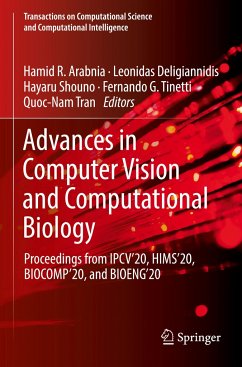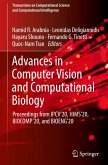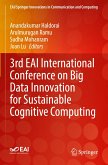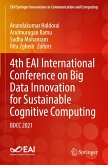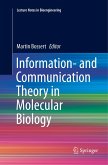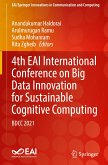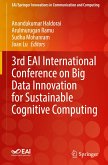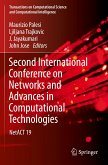Advances in Computer Vision and Computational Biology
Proceedings from IPCV'20, HIMS'20, BIOCOMP'20, and BIOENG'20
Herausgegeben:Arabnia, Hamid R.; Deligiannidis, Leonidas; Shouno, Hayaru; Tinetti, Fernando G.; Tran, Quoc-Nam
Advances in Computer Vision and Computational Biology
Proceedings from IPCV'20, HIMS'20, BIOCOMP'20, and BIOENG'20
Herausgegeben:Arabnia, Hamid R.; Deligiannidis, Leonidas; Shouno, Hayaru; Tinetti, Fernando G.; Tran, Quoc-Nam
- Broschiertes Buch
- Merkliste
- Auf die Merkliste
- Bewerten Bewerten
- Teilen
- Produkt teilen
- Produkterinnerung
- Produkterinnerung
The book presents the proceedings of four conferences: The 24th International Conference on Image Processing, Computer Vision, & Pattern Recognition (IPCV'20), The 6th International Conference on Health Informatics and Medical Systems (HIMS'20), The 21st International Conference on Bioinformatics & Computational Biology (BIOCOMP'20), and The 6th International Conference on Biomedical Engineering and Sciences (BIOENG'20). The conferences took place in Las Vegas, NV, USA, July 27-30, 2020, and are part of the larger 2020 World Congress in Computer Science, Computer Engineering, & Applied…mehr
Andere Kunden interessierten sich auch für
![Advances in Computer Vision and Computational Biology Advances in Computer Vision and Computational Biology]() Advances in Computer Vision and Computational Biology316,99 €
Advances in Computer Vision and Computational Biology316,99 €![3rd EAI International Conference on Big Data Innovation for Sustainable Cognitive Computing 3rd EAI International Conference on Big Data Innovation for Sustainable Cognitive Computing]() 3rd EAI International Conference on Big Data Innovation for Sustainable Cognitive Computing161,99 €
3rd EAI International Conference on Big Data Innovation for Sustainable Cognitive Computing161,99 €![4th EAI International Conference on Big Data Innovation for Sustainable Cognitive Computing 4th EAI International Conference on Big Data Innovation for Sustainable Cognitive Computing]() 4th EAI International Conference on Big Data Innovation for Sustainable Cognitive Computing121,99 €
4th EAI International Conference on Big Data Innovation for Sustainable Cognitive Computing121,99 €![Information- and Communication Theory in Molecular Biology Information- and Communication Theory in Molecular Biology]() Information- and Communication Theory in Molecular Biology81,99 €
Information- and Communication Theory in Molecular Biology81,99 €![4th EAI International Conference on Big Data Innovation for Sustainable Cognitive Computing 4th EAI International Conference on Big Data Innovation for Sustainable Cognitive Computing]() 4th EAI International Conference on Big Data Innovation for Sustainable Cognitive Computing121,99 €
4th EAI International Conference on Big Data Innovation for Sustainable Cognitive Computing121,99 €![3rd EAI International Conference on Big Data Innovation for Sustainable Cognitive Computing 3rd EAI International Conference on Big Data Innovation for Sustainable Cognitive Computing]() 3rd EAI International Conference on Big Data Innovation for Sustainable Cognitive Computing161,99 €
3rd EAI International Conference on Big Data Innovation for Sustainable Cognitive Computing161,99 €![Second International Conference on Networks and Advances in Computational Technologies Second International Conference on Networks and Advances in Computational Technologies]() Second International Conference on Networks and Advances in Computational Technologies192,59 €
Second International Conference on Networks and Advances in Computational Technologies192,59 €-
-
-
The book presents the proceedings of four conferences: The 24th International Conference on Image Processing, Computer Vision, & Pattern Recognition (IPCV'20), The 6th International Conference on Health Informatics and Medical Systems (HIMS'20), The 21st International Conference on Bioinformatics & Computational Biology (BIOCOMP'20), and The 6th International Conference on Biomedical Engineering and Sciences (BIOENG'20). The conferences took place in Las Vegas, NV, USA, July 27-30, 2020, and are part of the larger 2020 World Congress in Computer Science, Computer Engineering, & Applied Computing (CSCE'20), which features 20 major tracks. Authors include academics, researchers, professionals, and students.
Presents the proceedings of four conferences as part of the 2020 World Congress in Computer Science, Computer Engineering, & Applied Computing (CSCE'20);Includes the tracks on Image Processing, Computer Vision, & Pattern Recognition, Health Informatics &Medical Systems, Bioinformatics, Computational Biology & Biomedical Engineering;Features papers from IPCV'20, HIMS'20, BIOCOMP'20, and BIOENG'20.
Presents the proceedings of four conferences as part of the 2020 World Congress in Computer Science, Computer Engineering, & Applied Computing (CSCE'20);Includes the tracks on Image Processing, Computer Vision, & Pattern Recognition, Health Informatics &Medical Systems, Bioinformatics, Computational Biology & Biomedical Engineering;Features papers from IPCV'20, HIMS'20, BIOCOMP'20, and BIOENG'20.
Produktdetails
- Produktdetails
- Transactions on Computational Science and Computational Intelligence
- Verlag: Springer / Springer International Publishing / Springer, Berlin
- Artikelnr. des Verlages: 978-3-030-71053-8
- 1st edition 2021
- Seitenzahl: 948
- Erscheinungstermin: 7. August 2022
- Englisch
- Abmessung: 235mm x 155mm x 51mm
- Gewicht: 1404g
- ISBN-13: 9783030710538
- ISBN-10: 303071053X
- Artikelnr.: 64293561
- Herstellerkennzeichnung
- Books on Demand GmbH
- In de Tarpen 42
- 22848 Norderstedt
- info@bod.de
- 040 53433511
- Transactions on Computational Science and Computational Intelligence
- Verlag: Springer / Springer International Publishing / Springer, Berlin
- Artikelnr. des Verlages: 978-3-030-71053-8
- 1st edition 2021
- Seitenzahl: 948
- Erscheinungstermin: 7. August 2022
- Englisch
- Abmessung: 235mm x 155mm x 51mm
- Gewicht: 1404g
- ISBN-13: 9783030710538
- ISBN-10: 303071053X
- Artikelnr.: 64293561
- Herstellerkennzeichnung
- Books on Demand GmbH
- In de Tarpen 42
- 22848 Norderstedt
- info@bod.de
- 040 53433511
Professor Hamid R. Arabnia received a Ph.D. degree in Computer Science from the University of Kent (England) in 1987. He is currently a Professor Emeritus of Computer Science at University of Georgia, USA, where he has been since October 1987. His research interests include parallel and distributed processing techniques & algorithms, supercomputing, Data Science, imaging science, and other compute intensive problems. Applications of interest include: medical imaging and security. Most recent activities include: Studying ways to promote legislation that would prevent cyber-stalking, cyber-harassment, and cyber-bullying. As a victim of cyber-harassment and cyber-bullying, in 2017 he won a lawsuit with damages awarded to him for a total of $2.3 Million and $656K attorney costs. Since this court case was one of the few cases of its kind in the United States, this ruling is considered to be important; Final Judgement for damages was issued in Leon County Courthouse of Tallahassee in Floridaby Circuit Court Judge. Prof. Arabnia is Editor-in-Chief of The Journal of Supercomputing (Springer). He is also on the editorial and advisory boards of 30 other journals. He is the book series editor-in-chief of "Transactions of Computational Science and Computational Intelligence" (Springer). He has won 12 distinguished awards, including the "Outstanding Research Contributions to the Field of Supercomputing" (President of IEEE/SMC) and "Distinguished Research Award" for Outstanding Contributions to Adaptable Communication Systems (ACM SIGAPP IMCOM). Dr. Arabnia is Fellow and Advisor of Center of Excellence in Terrorism, Resilience, Intelligence & Organized Crime Research (CENTRIC). He has been a PI/Co-PI on about $8 Million externally funded projects, about $200K internally funded projects, and about $4 Million equipment grants. During his tenure as Director of Graduate Programs, Dr. Arabnia secured the largest level of funding in the history of the department for supporting the research and education of graduate students (PhD, MS). Dr. Arabnia has delivered a number of keynote and plenary lectures at international conferences; most recently at: The 14th IEEE International Conference on Parallel and Distributed Systems (ICPADS, Australia); International Conference on Future Generation Communication and Networking (FGCN / IEEE CS, Sanya); The 10th IEEE International Conference on High Performance Computing and Communications (HPCC, Dalian); and ACM IMCOM International Conference. He has also delivered a number of "distinguished lectures" at various universities and research units/centers (USA, Spain, South Korea, Japan, Iran, Saudi Arabia, UK, Canada, Turkey, China, Ireland, Australia, ...); his distinguished lectures were funded and sponsored by US Department of Defense, SERSC of Republic of Korea, US National Science Foundation, H2020 of Europe, and others. Dr. Leonidas Deligiannidis is a Professor of Computer Science at Wentworth Institute of Technology in Boston, MA. His foundation in Computer Science was first established when he earned his B.S. from Northeastern University College of Computer Science. He then went on to obtain two advanced degrees in the field from Tufts University. He has been active in the field since then, investigating subjects like Brain Computer Interfaces, Security, Business-oriented visualizations, and STEM Education. He has also served in industrial positions outside the scope of his academic work, using his acumen for several companies. His industry experience includes both entrepreneur startups in healthcare and high-tech networking companies. He has received multiple awards for his efforts, including multiple Achievement Awards for his contributions to Imaging Science by the World Congress in Computer Science, Computer Engineering, and Applied Computing, IEEE best paper awards, as well as a University Presidential award for his scholarly achievements. In addition, he has served asa referee for many journals in computer science and is a member of the program and organizing committees for notable conferences in his field. Professor Hayaru Shouno received his Ph.D degree from Osaka University, Japan in 1999. He is a professor of the University of Electro-Communications (Japan) from 2015. His research interests include artificial intelligence, artificial neural networks, and vision. He is the chair of Technical committee of neurocomputing (NC) in the Institute of Electronics, Information and Communication Engineers (IEICE) in Japan. Fernando G. Tinetti has a PhD in Computer Science and is a Professor at Facultad de Informatica, Universidad Nacional de La Plata, La Plata, Argentina. He is also a researcher of the Comision Investigaciones Cientificas de la Provincia de Buenos Aires, Argentina. He is a recipient of the NSF-TCPP Early Adopter Award, NSF/IEEE-TCPP, Curriculum Initiative on Parallel and Distributed Computing. He is the author/co-author of more than one hundred papers in International Journals and Computer Science Conferences. His areas of interest and experience include: High Performance Computing, Parallel and Distributed Computing, Cloud and Edge Computing, Real-Time Systems and Applications, Big Data Processing, Data Center and Infrastructure Performance Evaluation, Robotic Systems and Applications. He has co-edited a number of books in HPC. Prof. Dr. Quoc-Nam Tran is a full professor of Computer Science at Southeastern Louisiana University (SELU). Before moving to SELU, he was the Chair of Computer Science at the University of South Dakota, the flagship university of South Dakota. His research areas include computational methods and algorithmic foundations especially the computational methods for big data analysis and high performance computing in bioinformatics. Dr. Tran is the author/editor of 70 publications including three research books published bySpringer and Elsevier. He served as the General Chair and PC members of the many international conferences. He also served as an editor for books in the Elsevier Computer Science Reviews and Trends Series. Prof. Tran has industrial experiment in the area of software tools for computational methods. He has won many awards and has chaired a number of workshops and sessions for major conferences.
Introduction.- IPCV 2020.- Image Processing.- Computer Vision.- Pattern Recognition.- HIMS 2020.- Information Technologies for Healthcare Delivery and Management.- Health Data Acquisition, Management and Visualization.- Healthcare Knowledge Management and Decision Support.- Healthcare Modeling and Simulation.- Data Analytics, Data Mining and Machine Learning.- Health Information Systems.- Clinical Informatics.- Integrated Data Repository.- BIOCOMP 2020.- Bioinformatics and Big Data.- Big Data in genomics and cancer research.- Microarrays.- Bioinformatics and new cloud resources.- Molecular dynamics and simulation.- Molecular interactions.- Molecular sequence classification, alignment and assembly.- Molecular sequence and structure databases.- Computational Systems Biology.- Gene pattern discovery and identification.- Gene expression analysis; Gene expression databases.- Proteomics; Protein folding and fold recognition.- BIOENG 2020.- Medical Devices.- Modeling and Simulation.- Biomechanics.- Biomedical Imaging and Optics.- Biomedical and Nanomedical Systems.- Biomaterial.- Conclusion.
Introduction.- IPCV 2020.- Image Processing.- Computer Vision.- Pattern Recognition.- HIMS 2020.- Information Technologies for Healthcare Delivery and Management.- Health Data Acquisition, Management and Visualization.- Healthcare Knowledge Management and Decision Support.- Healthcare Modeling and Simulation.- Data Analytics, Data Mining and Machine Learning.- Health Information Systems.- Clinical Informatics.- Integrated Data Repository.- BIOCOMP 2020.- Bioinformatics and Big Data.- Big Data in genomics and cancer research.- Microarrays.- Bioinformatics and new cloud resources.- Molecular dynamics and simulation.- Molecular interactions.- Molecular sequence classification, alignment and assembly.- Molecular sequence and structure databases.- Computational Systems Biology.- Gene pattern discovery and identification.- Gene expression analysis; Gene expression databases.- Proteomics; Protein folding and fold recognition.- BIOENG 2020.- Medical Devices.- Modeling and Simulation.- Biomechanics.- Biomedical Imaging and Optics.- Biomedical and Nanomedical Systems.- Biomaterial.- Conclusion.

